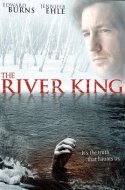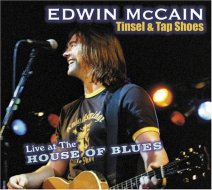

May/June, 2006
Lee Rogers, "Drawing Clocks," Zenith Cafe 106, 2006
As a boy growing up on the east coast of Ireland in a working class town with the mellifluous name of Carrickfergus,
Lee Rogers got an earful of Van Morrison, one of his father's favorite singers. Whether this exposure was an act of
prescience or mere musical imprinting can be debated, but no one can argue the similarity between Rogers' and Van
Morrison's soulful vibe today. "Drawing Clocks," Lee Rogers' debut CD, is a version of an earlier demo CD named "Promise
of Day," reworked in the studio from a raw to polished product which even adds strings, an embellishment which might
seem a bit oxymoronic for an R&B recording. But it works very well, especially on the atmospheric "How Will I
Sleep?," chosen by Myriad Pictures for the soundtrack of the eerie drama "The River King." One of the lyrics
embedded in this haunting tune reads "There's a fine line between my love and my fear" and could very well be a
thematic recap of the film, in which Ed Burns plays a cop caught between conflicting passions of sorting
out a tormented past and remaining true to his work. The standout track is "Love, Love, Love," ushered in by
an unhurried drone of minor chords which is then pierced by impassioned vocals sounding like Sting at his
stratospheric best. Lee Rogers' songwriting is incredible, but most will be awestruck by his voice
which sounds much like Paul Carrack, Paul Rodgers or Elton John... a one-uppance of Van Morrison himself.
Bryan Sutton, "Not Too Far From the Tree," Sugarhill Records SUG-CD-4001, 2006
Right off, the concept of this instrumental collection
appeals to the dreamer in us all. Nashville session
guitar whiz Bryan Sutton assembles a guitarist's who's
who of his personal musical idols, and then performs
14 finger-flying duets with them. Sutton chooses
tracks that capture as much interplay between the
guitars as possible. He noted that his selections
would serve to highlight the style of his heroes as
well as his own interpretations of their work. It's a
tall order, but there's no doubting Sutton's
versatility or capability. "Not Too Far from the
Tree" opens with Sutton and Dan Crary sprinting
through "Forked Deer." The liner notes explain the
selection as one that a fuzzy-cheeked Sutton learned
from a series of teaching audio tapes years ago. And
so it goes: from Norman Black to Tony Rice to Jerry
Douglas -- all with their stories of pleasure and
realizations. As if that's not enough, sit back and
enjoy Sutton's interplay with Doc Watson ("Whiskey
Before Breakfast"), Earl Scruggs ("Give Me the
Roses"), and Ricky Skaggs ("Carroll County Blues").
Does anyone out there NOT love Doc Watson? But the
real heart-tugger is the duet with his father
-- his first guitar teacher -- recorded in his living room.
Most of the tracks are recorded with a mobile unit,
which lends a nice sense of intimacy to the project.
It sounds "real" instead of "produced." For the guitar
geeks among us, Sutton lists the guitars played
throughout the project. Scruggs weighed in with a 1964
Martin D-18, one of three artists playing a D-18.
Though bluegrass-based, the appeal of this joyful
collection should be universal.
Bryan Sutton's Website Buy it at Amazon.com
Tim Miller, "Trio," 2005
Tim Miller's current release, "Trio," is quite possibly one of the most groundbreaking and enthralling collections
of contemporary jazz guitar music recorded in the last decade. His distinctive sound involves the placement of a
microphone near his Klein hollow chambered guitar's body, which is then blended with the traditional tones
emanating from his pickups. The result of this innovative recording method is a truly distinctive guitar voice,
both purely acoustic and electric at the same time, and one which is further augmented by the artist's amazing
command of his instrument. Miller has a very pianistic approach to fingerboard harmony utilizing lush, intricate
chord voicings reminiscent of Keith Jarrett or Bill Evans. His soaring legato style soloing, often using rich,
warm violin-like sustain, allows the artist to create long fluid lines not unlike John Coltrane's archetypical
sheets of sound. Both Josh Davis' spirited upright and Take Toriyama's vigorous percussion complement and
elevate the guitarist's phenomenal playing. Throughout the twelve original pieces, Miller demonstrates his
depth as a composer and improviser. Beautifully expressive and introspective ballads, featuring Miller's
pristine acoustical sound, grace many of the compositions on this recording. On "The Trees, The Sun" the
guitar takes on an ethereal bell-like quality to produce a hauntingly striking melody, echoing in one's memory
long after the piece is over. Another interesting composition is "TR," a bitter sweet pastoral ballad, filled
with poignant chord changes and tasteful, contemplative soloing. Other pieces like "United" and "Density One"
feature blistering bop inspired excursions blending seamlessly into Hendrix inspired pentatonic riffing.
Miller really knows how to build a solo alternating between rapid fire chromatic runs and stylishly
executed melodic motifs. This album is filled with memorable melodies, extraordinary improvisational journeys,
and unique tonal innovations. With "Trio," Tim Miller has created a recording of inimitable sound paintings
joining an elite register of musicians who are changing the way we listen to music.
Edwin McCain, "Lost in America," Vanguard Records 935-2, 2006
Don't let the title fool you, platinum selling singer/songwriter Edwin McCain knows exactly where he is. McCain lives
for groove on this warm amalgamation of roots rock, blue eyed soul, and contemporary folk. From the opening bar of
"Gramercy Park Hotel" (a paean to American icon Babe Ruth "he was a drunkard just like me / he lived it high, he
lived it low") drummer Dave Harrison and bassist Lee Hendricks literally slide into home plate, affording McCain
a simmering platform to ply his broken-hearted lyrics in his I've-seen-it-all tenor. "Truly Believe" pilfers a
famous Joe Walsh riff, though McCain makes it his own by the time the verses kick in with jazzy chord changes and
Craig Shield's swishy B3 organ swirls. Lyrically, McCain tackles common topics (love lost, love found, good things
gone bad) while managing to avoid clichés. He can kick out the jams with the best of them too, as evidenced by the
blistering "My Mystery" which quotes "Strawberry Fields" then transforms into an arena rocker of Bon Jovi proportions
(no disrespect intended). Larry Chaney's weeping slide guitar in the bluesy "Losing Tonight" floats somewhere between
George Harrison and Duane Allman. The title track, sung partially through a car radio effect ("well I made a small
fortune selling used cars / and it's buried out back in a cookie jar") emerges as a pretty pop gem abetted with simple
yet infectious overlapping guitar and vocal melodies. For fellow musicians, pay close attention to McCain's vocal
phrasing and inflections, he bends his notes in all the right places and punctuates his best lines with a rasp and
a crackle. Kudos to engineers Noel Golden and Shawn Grove as the mix sounds like the band is in the same room.
Highly recommended.
Edwin McCain's Website Buy it at Amazon.com
Dion, "Bronx in Blue", Dimensional Music Recordings DMR 062, 2006
Yes, it's THAT Dion. "The Wanderer" Dion. "Runaround
Sue" Dion. Most of us lost track of him after his
"Abraham, Martin and John" in 1968. But my-oh-my, Dion
emerges from the musical footnote realm to revel in
the musical baby that gave birth to rock n' roll.
We're talking about the blues, and Dion walks the walk
with a swagger that simply defies all expectation. On
the opening cut on "Bronx in Blue," he launches into the
classic "Walkin' Blues," and lets it all out -- that
haunting, hypnotic rhythm, the snaky guitar leads, the
smoky voice. And man-oh-man, that voice, it's just
perfect. Dion never lets up once throughout this
relentless collection. He channels the elegant power
and simplicity of the blues, and lets these emotive
tunes work their spells. By the time it's all over, he
covers a dozen classics and throws in a couple of his
own, just to show he still can, I guess. Liner notes
provide a number of insights into the history of the
tracks. Well represented are (of course) Robert
Johnson and Howlin' Wolf, plus Lightnin' Hopkins,
Jimmy Reed, Hank Williams, Bo Diddley's "Who Do You
Love," and Blind Willie McTell's "Statesboro Blues."
Even more impressively, he makes it all happen with a
single guitar and a smattering of percussion. This
stuff is magic.
Daniele Bazzani, "2006", 2006
Italy has produced several excellent solo fingerstyle guitarists over the past couple years who have become well known
in the international guitar community -- Franco Morone and Peppino D'Agostino are two who come quickly to mind.
These players carry with them an intrinsic melodic power, even when someone like D'Agostino bangs away on his
six string. On his website, none other than fingerstyle maestro Tommy Emmanuel tells us Bazzani "plays well,
really well." This collection of 14 solo pieces (with singing accompaniment on the last track by Gina Fabiani,
and Silvia Battisti D'Amario adding lovely viola on "The Baby") evidences various textures to Bazzani's playing,
and it's a fine introduction to audiences outside Italy. Some tunes are sparse and simple in arrangement, yet
strong in melody, like the melancholic "Close to the Heart", the CD's opening track; "Five Small Themes", and
"La Ninna Nanna del Cannello". Bazzani lays aside the steel string in favor of nylon on the rag
"Van Duser's Crawl," an homage to Guy Van Duser, and on the haunting "The Baby." Bazzani plays it
thumb-hot on "Goldfingers (for Tommy c.g.p)", obviously channeling one of his heroes, and doing a pretty
good job of imitation. "Inverno a Martelji" syncopates a slapped rhythm while picking out a clear melody.
The playing throughout the CD is bright, clean, and with a firm sense of direction. I think I agree with Mr.
Emmanuel -- Daniele Bazzani plays very well indeed.
Daniele Bazzani's Website Buy it at CD Baby
Sean Watkins, "Blinders On," Sugar Hill Records SUG-CD-3988, 2005
Nickel Creek's guitarist Sean Watkins stretches his studio wings in this solo outing to compelling effect. From
sonic noise to string quartet, with a bit of sound collage thrown in, he runs a seemingly effortless gamut of hard
to classify indie pop. It's fun to spot the influence of Semisonic's Dan Wilson on the lonesome ballad,
"I'm Sorry" and XM radio-friendly "Run Away Girl." Benmont Tench adds keyboard muscle to a number of tracks on
this release. Watkins' songs focus on the simple complexities of romantic entanglements as written from a
decidedly youthful perspective. This is not so much a collection of songs as it is a collection of movements,
from the home studio cut-and-paste of "Happy New Year" to the string quartet snippet of "Cammac." It hangs
together in a slightly disjointed way -- as if a latter-day Brian Wilson were at his shoulder at the console.
Make no mistake; Watkins is a talented young studio rat, whose delicate permutations recall the overachieving
Finn brothers. Some standout tracks include "Not That Bad/Blinders On" with its haunting vocal movements and
Beatlesque instrumental coda, "Run Away Girl," and "No Lighted Windows," featuring a great fiddle part by Gabe
Witcher. To sum it up, "Blinders On" is a rather delightful grab bag from a gifted artist who sports an
emerging producer's ear.
Sean Watkins' Website Buy it at Amazon.com
Michael Gulezian, "Concert at St. Olaf College," Timberline Music TMBR-0704, 2004
Michael Gulezian has at least four previously released CDs and recorded for John Fahey's Takoma label in the 1970s.
His music simultaneously evokes optimism, shared experiences and introspection. Gulezian's tone is dynamic and varied,
as he taps and slaps the guitar for percussive and harmonic effects at least as often as he picks it, either with
gusto worthy of a young Leo Kottke or a hushed delicacy. On this live solo disc he plays 6- and 12-string steel
guitars in several tunings. "Mile High Country" and "Little Meggie" conjure up images of stunning, unspoiled
American landscapes. "Watermelon," "Tumbledweeb," the bluesy "Meandering Jelique" and a loosely interpreted
"Jesu, Joy of Man's Desiring" feature his aggressive yet skilled slide playing. There is much in Gulezian's
approach to remind the listener of early John Fahey, Peter Lang and Leo Kottke, although these relationships
are fraternal, rather than that of a protégé and his mentors. "My Trampoline Heart" and "Whale in the Sky"
recall Joni Mitchell's guitar playing. A video on the CD includes excerpts of two tunes performed in full on
the audio program, some funny stage patter and an impromptu vocal, sung onstage by Gulezian and several friends.
Incorporating elements of American Primitive and New Age guitar sounds, Gulezian is a seasoned performer who
deserves the attention of anyone who loves solo fingerstyle guitar.
Michael Gulezian's Website Buy it at Amazon.com
The Wood Brothers, "Ways Not to Lose," Blue Note Records 0946 3 43120 2 8, 2006
The back photo shows the Wood brothers-eyes closed, faces heavenward-swept away in performance. It should show the
boys eye to eye, grinning at each other. "Ways Not to Lose" is about joy and reckless abandon in playing music. The
recording brings the sibs together for the first time after experiencing success going their separate ways (Chris
in the jazz jam of Medeski Martin and Wood; Oliver in the rock group King Johnson). There's an obvious element of
celebration in their reunion. Throughout, the brothers manage to maintain a playful attitude while respectfully
paying homage to the blues and other American musical forms ("Angel Band" for spirituals, for example). The
mischievous spirit of the title inhabits the record. Listen to the chuckling slide guitar notes that begin and
end the CD's opener, "One More Day," quite a swinging tune about convincing someone not to commit suicide.
Check out its dissolve to a full stop after the bridge. Or the key lyric in "Glad" ("It's good to see you / but
I'll be glad to see you go"), which must take on added significance for brothers. How about this title line in
a song about death, "If I die young / at least I got some / chocolate on my tongue."? The whole enterprise is rough
but ready. The engineer must have been told to turn up the raw dial to eleven. Chris Wood delivers lead vocals
as unrefined and dry as they come. The harmonies are never pretty. Oliver's guitar has more than a touch of
the Ribot in it. Don't miss the pump organ wheeze of the harmonica in "Where My Baby Might Be." All of this in
songs that keep the hook in mind ("Luckiest Man"). It's a fine line the Woods tread finely, a task made easier
as Chris' bass keeps matters moving along nicely. From beginning to end, it's a hoot and a great listen. Give
it the ultimate test on a road trip and you'll agree, "Ways Not to Lose" is a real winner.
The Wood Brothers' Website Buy it at Amazon.com
Ken Hatfield, "String Theory," Arthur Circle Music ACM 7502, 2005
Jazz guitarist and composer Ken Hatfield turns
reflective on his sixth CD, "String Theory." The quantum
mechanics reference in the title serves as a strong
hint of Hatfield's seriousness about this instrumental
work; the titles of the movements from the title piece
are "Quirks and Quarks," "The Ties That Bind," and
"Sparticles". And, to be sure, Hatfield does offer
some choice rewards for the serious listener. Though
his main instrument is nylon-stringed classical
guitar, he also duets with himself on mandolin and
dobro. The result is a multi-layered work that expands
upon previous classical and jazz CDs for a slight and
occasional Appalacian (his roots) flavor, and only
then in carefully measured doses. While "The Gospel
According to Sam," the 13-movement "Snowhill
Variations" and "Borges and I" all have their
revealing moments, it is the intricate meanderings of
mandolin and classical guitar in the title track of
"String Theory" that most capture the imagination. In
that work, Hatfield sounds to be peeling away the
secrets of the universe and of existence, a theme
revisited throughout. Impeccable technique, a
confidence of presentation and an ear for intertwining
somewhat disparate themes mark this collection.
Equally at ease with a Wes Montgomery-style melodic
run or a Bach-like fugue approach, Hatfield enjoys an
edgy balancing act.
©
Fred Kraus
Ken Hatfield's Website Buy it at Amazon.com
Jesse Colter, "Out of the Ashes," Shout Factory DK 97640, 2006
Jesse Colter is an important artist, with solo hits in the 70's and 80's. An integral member of the Outlaw Country
movement, she recorded (with Waylon, Willie and Tompall Glaser) "Wanted! The Outlaws," the first country album
certified platinum. But don't think of "Out of the Ashes" (her first solo release in twenty years) as a comeback
album and don't dare unearth the old cliché that Jessi Colter never went away at all. The record begins and ends
with spirituals, closing with a song "inspired by" the movie "Passion of the Christ," co-written and sung with
her son (and Waylon's), Shooter Jennings. In between are tunes about all kinds of passion, with the worldly ones
given a prominent place. There's even a faithful cover of Dylan's "Rainy Day Women #12 and 35" with its refrain
of "everyone must get stoned." "You Can Pick 'Em" finds Colter quite able to belt out a rousing, bluesy
putdown. It also introduces the band with some sizzling electric fills and nice solos on steel guitar
(Robbie Turner) and harmonica (Kurt Johnson). The CD's most incandescent moment comes in Tony Jo White's
"Out of the Rain." Originally recorded in the 80's but unfinished, the cut has Colter trading verses with
guests. Producer Don Was risks overproduction here (bringing in an entire church choir), but-on balance-the
dynamics create a dazzling effect. Quiet reigns as Colter begins her verse. After the hooky chorus fills the
sonic space, everything settles back for White's verse, followed by another big chorus. When Waylon comes on
after a return to quietness, expect shivers. "Velvet and Steel," sensual and suggestive, goes out to a "slow
movin' daddy" who makes the singer feel "velvet inside." Note the fine interplay between the harmonica and
the electric guitar. What arose out of the ashes is Jessi Colter's passion to write and record music,
music about passion of all kinds both sacred and profane. Songs like "Out of the Rain" might blur that
distinction but, everywhere in "Out of the Ashes," the passion is unmistakable.
Jesse Colter's Website Buy it at Amazon.com
John Morgan, "Motionography", 2006
I remember hearing some of John Morgan's early recordings, enjoying the melodies, and thinking, 'these are nice songs,
but his playing lacks a certain depth.' Well, with "Motionography," his fourth solo independent CD, Morgan's playing
has gained lots of ground, and this is a fine collection of 13 solo acoustic guitar pieces. Perhaps those two visits
to Jorma Kaukonen's Fur Peace Ranch have made a difference. His time in each song is rock solid, not floating like
some new acoustic music. Morgan likes to paint pictures which really reflect the title, and there is a strong
connection on many songs. For example, flowing arpeggios and harmonics grace "Moonrise," and I can picture the
beginning of nighttime in the evening sky. "First Flight" appropriately opens the disk, revealing a strong right
hand. Many of the songs on the CD reflect an evolving jazz sense -- "Dancing Daughter" weaves in and out of
fingerpicked melody lines and rhythmic chords, with a layer of staccato bass grooving the tune, while "One
Step Closer to Cool" really swings. "Dance of the Stars" is a joyful, rollicking celebration of the wonder
of creation in the heavens. We flow stroke for stroke with "The Swimmer". Some of his best work is on the
traditional Christmas carol, "O Come, O Come, Emmanuel." Here, the longing and hope embedded in the song's
lyrics find a voice with his fingers, while his improvisation between verses deepens the mood.
©
Kirk Albrecht
John Morgan's Website Buy it here
Mission Street Project, "Liberty Tree", 2005
Phil Ochs famously defined a protest song as "a song you don't hear on the radio." Before the last presidential
election, that dictum still rang true, even on folk radio. Where was political music amid the backdrop of a
controversial war? Erik Balkey took on a mission to produce a body of socially conscious, plainspoken music.
His touchstone would be the American tradition (Woody Guthrie, union songs, mining tales of Appalachia). His
sensibility would come from contemporary singer/songwriting. Balkey's vision has found its first expression in
"Liberty Tree." For Balkey, a solo performer, Mission Street is a side project and, on record, a band: Balkey
and his hushed tenor, vocalist Laurie McAllister (the cliché "lovely and talented" applies), and Duke Levine,
master of all things stringed. Don't expect: anything uptempo, musical complexity, cuts above four minutes.
Expect: insightful story songs about regular folks, co-writes with the best songwriters you probably never
heard of, simple melodies, lovely harmonies, tasteful instrumental support, a few well-chosen covers, and
sincerity you won't hear out of the White House. You'll also find the best darn CD package around: lyrics,
chords, comments by co-writers. "Should I Go Wordless" opens. It's Balkey's declaration. He has something
to say and he's gonna to say it now because he has "2,000 reasons why" (today, 2,363 and rising). One of
the best songs, "Cut 'em Down" (written with Jonathan Byrd) transfers the metaphor of a clear cut (and the
worker who has little choice but to take "a job cutting trees") to the war machine that "count(s) the men
just like trees." The pretty "Sanctuary Road" (written with Ryder Daniels) tackles the problem of well-meaning
folks who flee the city, making desirable places unaffordable for the natives. Covers of John Fogerty, Johnny
Cash, and Dave Carter are also highlights. Balkey knows to keep it all simple and hum-able. Maybe he's a bit
prescient, too. Since he began his project, fine protest songs from Eliza Gilkyson to James McMurtry to the
Rolling Stones have hit the airways. Mission accomplished (and I really mean it!).
©
David Kleiner
Mission Street Project's Website Buy it at CD Baby
©
Alan Fark
Buy it at Amazon.com
Listen to "Love, Love, Love" (mp3)
Listen to Lee Rogers at our podcast 
©
Fred Kraus
Listen to "Stoney Creek" (mp3)
©
James Scott
Buy it at Amazon.com
Listen to "Shift" (mp3)
Listen to Tim Miller at our podcast 
©
Tom Semioli
Listen to "Losing Tonight" (mp3)
©
Fred Kraus
Buy it at Amazon.com
Listen to "Walkin' Blues" (mp3)
©
Kirk Albrecht
Listen to "Goldfingers (For Tommy, C.G.P.)" (mp3)
©
Steve Klingaman
Listen to "No Lighted Windows" (mp3)
©
Patrick Ragains
Listen to Little Meggie (mp3)
©
David Kleiner
Listen to "Chocolate on My Tongue" (RealAudio)
Listen to "Sparticles" (mp3)
©
David Kleiner
Listen to You Can Pick 'Em (wma)
Listen to "First Flight" (mp3)
Listen to "You Can Stay Here" (mp3)

 (Click on image below to buy) |
 DVD: "The River King" |
 Allan Holdsworth DVD |
 Edwin McCain DVD |
Tommy Emmanuel transcriptions |